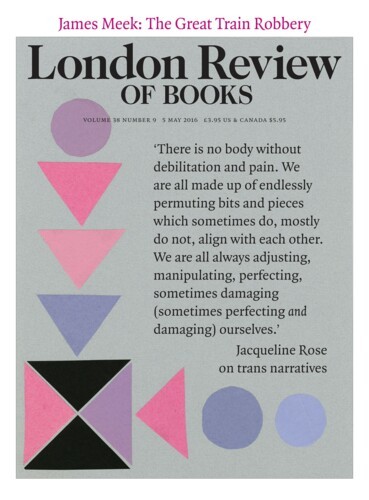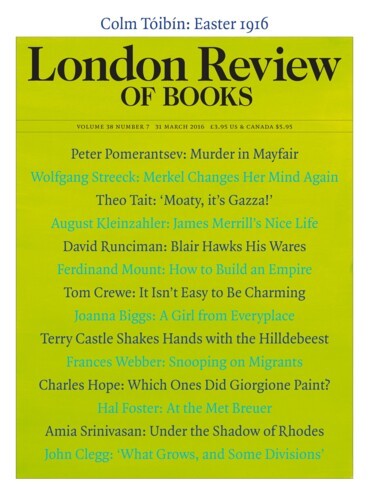England played against Russia like a team that could win this tournament, but also like a team that almost certainly won’t. It’s the usual story: you worry about them getting tired. In the first half they looked at times like world-beaters – Euro-beaters anyway – but the second half wasn’t so good (it very rarely is for England at big tournaments) and in the end they couldn’t hang on. So far, so familiar. However, it’s more specific than that. This time you worry about them getting Tottenham tired.
David Runciman
David Runciman is an honorary professor of politics at Cambridge. His books include Political Hypocrisy: The Mask of Power, from Hobbes to Orwell and Beyond, How Democracy Ends and Confronting Leviathan: A History of Ideas. He has written more than a hundred pieces for the LRB on subjects including Lance Armstrong, gambling, all three volumes of Charles Moore’s biography of Thatcher, Donald Trump’s election and his defeat. He is the host of the podcast Past Present Future.
The Euros have always had a couple of advantages over the more grandiose spectacle of the World Cup. First, genuine outsiders do sometimes win the whole thing. It’s happened twice in the last six tournaments. In 1992 the Danish team, who hadn’t qualified for the finals, were summoned off the beach after Yugoslavia had to pull out (shortly before ceasing to exist); they ended up beating the Germans in the final. In 2004 Greece came from more or less nowhere to lift the trophy, defeating home favourites Portugal in both the first match of the tournament and the last. No outsider has ever won a World Cup, unless you count West Germany in 1954 (the so-called ‘Miracle of Bern’). Almost by definition, any sporting contest that has to look to German success to provide evidence of its unpredictability is a fairly closed shop.
As someone who struggles to remember basic facts about my family (middle names, dates of birth), I’m grateful when online security questionnaires give the option of naming the sports team you most want to lose. I know the answer to that one: Manchester United. I have sometimes wondered how much use it is as a security filter. Isn’t almost everyone’s answer to that question Manchester United? Now I face a dilemma. If the question asked me to name my favourite manager I’d also have no trouble supplying an answer: Jose Mourinho. That, I realise, is a more unusual response.
Short Cuts: Shuffling Off into Obscurity
David Runciman, 5 May 2016
David Laws’s memoir of his time in government ends with everything in tatters: he has lost his seemingly safe seat, his party has gone from being a full partner in government to having the same number of MPs as the Democratic Unionists, his leader is shell-shocked and barely able to appear in public without breaking down. Clegg is not the only one: there are lots of tear-stained...
Deliverology: Blair Hawks His Wares
David Runciman, 31 March 2016
Since he left office in 2007 Tony Blair has been hawking his wares around the world, from Nigeria to Kazakhstan. What has he been selling? Himself, of course, plus his reputation, and perhaps his party’s too, somewhere down the river. But he’s also been peddling an idea: deliverology. Tom Bower reports Blair telling Paul Kagame, the Rwandan president, back in 2007: ‘I learned by bitter experience during ten years as prime minister the problems of getting the government machine to deliver what I wanted. I created a Delivery Unit, and that was a great success.’
Podcasts & Videos
Montaigne
David Runciman
For the first episode in the new series of History of Ideas – on the great essays and the great essayists – David discusses Montaigne, the man who invented a whole new way of writing and being read.
Hume
David Runciman
For the second episode in this season of History of Ideas, David discusses the Scottish philosopher David Hume and explores how eighteenth-century arguments about the national debt can help make sense...
Pieces about David Runciman in the LRB
In a Frozen Crouch: Democracy’s Ends
Colin Kidd, 13 September 2018
A historian ought to know better, I suppose. But for the last decade – ever since I passed a long queue of anxious depositors outside a branch of Northern Rock in September 2007...
What to Tell the Axe-Man: Hypocrisy and Mendacity
Jeremy Waldron, 6 January 2011
When American politicians are caught having illicit sex – like Eliot Spitzer, who resigned as governor of New York in 2008 after it was revealed that he was using a call-girl when he went...
Boy Scouts, Bands of Hope, Football Clubs and Corner Shops
Jose Harris, 2 October 1997
Throughout the history of political thought, attempts to imagine, classify and explain possible modes of political life have been characterised by starkly polarised and stylised antinomies. Among...
Read anywhere with the London Review of Books app, available now from the App Store for Apple devices, Google Play for Android devices and Amazon for your Kindle Fire.
Sign up to our newsletter
For highlights from the latest issue, our archive and the blog, as well as news, events and exclusive promotions.



